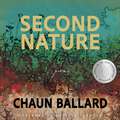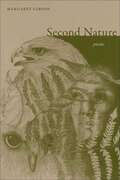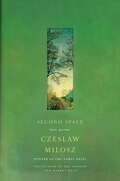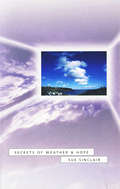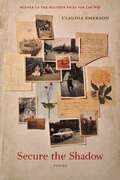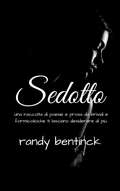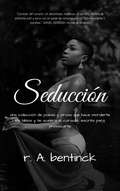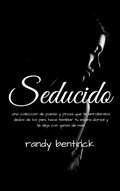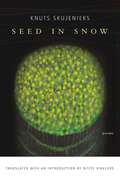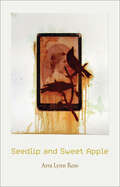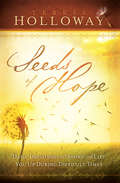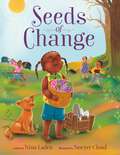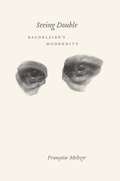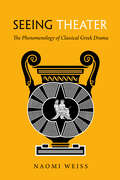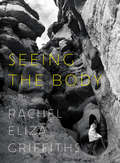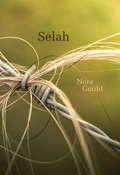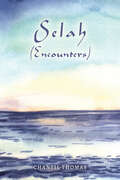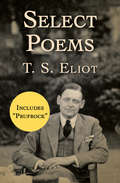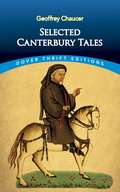- Table View
- List View
Second Nature
by Chaun BallardWinner of the 23rd annual Poulin Prize Chaun Ballard’s gripping debut collection weaves childhood experiences, historical events, and family stories into a living tapestry of memory that celebrates the landscape of Black America, both rural and urban. Riddled with the ghostly voices of family and friends, Second Nature is fearless in its wrestling with America’s fractured past and troubled present. In these poems, W.E.B. DuBois and Fredrick Douglass have a conversation, Michael Brown meditates on the nature of the cosmos, Johnnie Taylor’s guitar sings in sonnets, and the road Walt Whitman set out upon comes alive for a new generation. Through innovative re-imaginings of the sonnet, the pastoral, and the contrapuntal, Ballard engages with popular culture while examining the intricacies of all that is wedded together—form and content, mothers and fathers, grandmothers and grandfathers, husband and wife, and a nation long dependent on created binaries that serve to maintain structures of oppression. Interspersed with quotations and inspired by the rich legacy of poets who came before him—including poet Matthew Shenoda who provides an insightful Foreword to the collection—Second Nature is a testament to interconnectedness, a love letter to the deep roots that we come from, and a reminder of the myriad ways in which one’s identity is shaped by community and country.
Second Nature: Poems
by Margaret Gibson“Learn of the green world what can be thy place,” wrote Ezra Pound. In Second Nature, her tenth collection of poems, Margaret Gibson takes Pound’s stern counsel to heart. With stunning clarity, these poems move from acute observation to an empathy, participation, and intimacy that continues Gibson’s search to experience the “one body” of the world in direct encounter and to translate that encounter into words. As Emerson tells us, the Spirit moves throughout Nature and through us—our art is, therefore, second nature. Whether Gibson’s poems take us to Greece and to “a writing desk no larger than a page of light” or whether they explore the woods that surround her house, all of the poems arise from the desire to embrace a “fierce, clear-eyed attention” and to be open to revelation. Her poems re-imagine watchfulness, seeing beyond surfaces, listening to what is innermost. Second Nature gives us poems that are a ripening of years of poetic and spiritual practice—simply Gibson at her best.
Second Space
by Czeslaw MiloszNobel laureate Czeslaw Milosz's most recent collection Second Space marks a new stage in one of the great poetic pilgrimages of our time. Few poets have inhabited the land of old age as long or energetically as Milosz, for whom this territory holds both openings and closings, affirmations as well as losses. "Not soon, as late as the approach of my ninetieth year, / I felt a door opening in me and I entered / the clarity of early morning," he writes in "Late Ripeness." Elsewhere he laments the loss of his voracious vision -- "My wondrously quick eyes, you saw many things, / Lands and cities, islands and oceans" -- only to discover a new light that defies the limits of physical sight: "Without eyes, my gaze is fixed on one bright point, / That grows large and takes me in."Second Space is typically capacious in the range of voices, forms, and subjects it embraces. It moves seamlessly from dramatic monologues to theological treatises, from philosophy and history to epigrams, elegies, and metaphysical meditations. It is unified by Milosz's ongoing quest to find the bond linking the things of this world with the order of a "second space," shaped not by necessity, but grace. Second Space invites us to accompany a self-proclaimed "apprentice" on this extraordinary quest. In "Treatise on Theology," Milosz calls himself "a one day's master." He is, of course, far more than this. Second Space reveals an artist peerless both in his capacity to confront the world's suffering and in his eagerness to embrace its joys: "Sun. And sky. And in the sky white clouds. / Only now everything cried to him: Eurydice! / How will I live without you, my consoling one! / But there was a fragrant scent of herbs, the low humming of bees, / And he fell asleep with his cheek on the sun-warmed earth."
Secretaries of the Moon: The Letters of Wallace Stevens and José Rodriguez Feo
by Alan Filreis Beverly CoyleThe letter from Jose Rodriguez Feo that prompted Stevens's poem was the third in a ten-year correspondence (1944-54) between the poet and the young Cuban, who quickly became Stevens's "most exciting correspondent." The two shared a Harvard education, both were anxious to see Stevens translated for a Cuban audience, and each had an enduring admiration for Santayana, whose awareness of the cultural tensions between the Northern and Southern hemispheres formed a basis for the protracted argument between Stevens as the practical, Protestant father and the passionate Rodriguez Feo. The Cuban's descriptions of his life at the Villa Olga, of his black-and-white cow Lucera and his mule Pompilio, delighted Stevens, as did his wide-ranging questions and pronouncements of literary matters. Unaware of the well-known Stevens reticence, Rodriguz Feo elicited a more informal, playful response than Stevens's other correspondents. Formal salutations soon gave way to "Dear Antillean," "Dear Wallachio."Coyle and Filreis present the entire extant correspondence between the two men. The fifty-one Rodriguez Feo letters and ten of the numerous Stevens letters are printed here for the first time, and the exchange between the two is unusually complete. The work includes a critical introduction and complete annotation of the letters.
Secrets of Weather & Hope
by Sue SinclairShortlisted for the 2002 Gerald Lampert Award Sue Sinclair's poems speak from that precise place where our perception of the world and our capacity for language meet and embrace, where our sense of experience goes to get sharpened and refreshed. That experience might involve the inner lives of clouds, the flourishing and passing of a tulip, the evocative scent of wolf willow, or the intricate arts of Bach and Virginia Woolf. These poems are deft, musical, and quick in the moment, alive to the sensuous surface and the meditative depth, their antennae fully extended.
Secure the Shadow: Poems (Southern Messenger Poets)
by Claudia EmersonDaringly realistic and artfully mediated by past and present, Claudia Emerson's Secure the Shadow contains historical pieces as well as poems centering on the deaths of the poet's brother and father. Emerson covers all aspects of the tragedies that, as Keats believed, contribute to our human collective of Soul-making, in which each death accrues into an immortal web of ongoing love and meaning for the living. Emerson's unwavering gaze shows that loss cannot be eluded, but can be embraced in elegies as devastating as they are beautiful.The macabre title poem refers to the old custom of making daguerreotypes, primitive photographs, of deceased loved ones. Other striking poems describe animal deaths -- mysterious calf killings, a hog slaughter, the burial of a dead jay, "identifiable / but light, dry, its eyes vacant orbits." Death, as the speaker's heart and mind instruct her, exists in a shadow world. When the body disappears, the shadow also flees. By securing the shadow, the poet finds a representation of the dead's soul, a soul always linked to the body. Hence, Emerson's attention to the minute details of the body's repose -- reflected in the long, related sequence of refrained poems -- never allows its memory to fade.
Sedotto: Una collezione di poesie e prosa formicolanti e che ti lasciano desiderare di più
by R. A. BentinckL'arte della seduzione non consiste nel far fare a qualcuno ciò che non vuole, ma nel convincere qualcuno a fare ciò che segretamente vuole già fare. Se sei qui per entrare nell'umore di leggere alcune poesie romantiche e da brividi, sei nel posto giusto. Perditi in oltre 160 poesie accuratamente scritte su oltre 300 pagine di puro piacere estatico. Perdi le tue inibizioni e sentiti libero di lasciarti andare in questi versi sensuali che celebrano l'arte della seduzione. Tutto quello che devi fare è portare una mente aperta e rilassarti. Lascia che i dispositivi di poesia in ogni linea illuminino il tuo fuoco interiore e alimentino i tuoi desideri segreti in modi indicibili. Questo libro stimolerà i tuoi sensi in modi che ti faranno chiedere di più, e con una fertile immaginazione e una mente aperta, godrai di ogni esperienza formicolio e formicolio lungo la strada con questa seducente raccolta di poesia e prosa.
Seducción
by Marco VillalobosLa atracción nunca debe ser subestimada. No sea que pierda gradualmente su deliciosa aventura, brillo,encanto y magia etérea. Deberíamos esforzarnos constantemente por revitalizar los fuegos moribundos de la pasión. Alimenta las llamas del anhelo de una manera que les permita descontrolarse aunque sea momentáneamente. En esta compilación refrescante y única de versos y prosa contemporáneos, Bentinck ha reunido varias piezas garantizadas para acariciar su lado seductor. Él alienta a pensar en alguien especial con deseos inquietos que conducen al precipicio de la sensualidad antes de que su autocontrol limitado desaparezca. Seducción celebra con entusiasmo la magnífica belleza de la pasión, la tentación y la atracción irresistible con creatividad poética y arte. Incrustado en esta colección de poesía única, hay un uso hábil de metáforas e imágenes aptas que tientan sus fantasías insasiables. Alimentan tus antojos insatisfechos, deleitan tu lujuria sedosa y despiertan tu curiosidad hacia el pináculo de una explosión aventurera. Después de completar esta colección, te dejará con el deseo de expresarte, explorar y consentirte con esa persona importante. Encontrarás la motivación para buscar formas experimentales y creativas de comunicar su pasión y deseos sin culpa.
Seducido: Una colección de poesía y prosa que te enrollará los dedos de los pies, hace temblar tu espina dorsal y te deja con ganas de más.
by R. A. BentinckEl arte de la seducción no se trata de hacer que alguien haga lo que no quiere, se trata de atraer a alguien para que haga lo que secretamente ya quiere hacer. Si estás aquí para ponerte de humor para leer poesía romántica y conmovedora, estás en el lugar correcto. Piérdete en más de 160 poemas cuidadosamente escritos en más de 300 páginas de puro placer extático. Pierda sus inhibiciones y siéntase libre de disfrutar de estos versos sensuales que celebran el arte de la seducción. Todo lo que debe hacer es traer una mente abierta y relajarse. Deje que los dispositivos de poesía en cada línea enciendan su fuego interior y alimenten sus deseos secretos de maneras indescriptibles. Este libro estimulará tus sentidos de una manera que te mantendrá pidiendo más, y con una imaginación fértil y una mente abierta, disfrutarás de cada experiencia en el camino con esta colección seductora de poesía y prosa.
See How We Almost Fly
by Alison LutermanSee How We Almost Fly, selected winner of the 2008 Pearl Poetry Prize by Gerald Locklin, is Alison Luterman's second book of poetry. Here she presents a dazzling array of characters and subjects that reflect her rich and various life as daughter, friend, lover, teacher, and world traveler.
Seed in Snow
by Knuts SkujenieksThis first U.S. publication of Knuts Skujenieks-one of Latvia’s foremost poets-is the author’s most important and widely-translated body of work. Convicted in 1962 of anti-Soviet sentiment, Skujenieks wrote these poems during seven years of imprisonment at a labor camp in Mordovia. Vivid and expressive, this collection overcomes the physical experience of confinement in order to assert a limitless creative freedom.
Seedlip and Sweet Apple: Poems
by Arra Lynn Ross“A miraculous text of narrative and speech fragments . . . to raise up Mother Ann Lee, founder of the Shakers, her ecstatic voice, energy, and vision.” —Hilda Raz, award-winning author of Letter from a Place I’ve Never BeenSeamlessly bridging the material and spiritual worlds, Seedlip and Sweet Apple takes the reader into the mind of a true visionary: Mother Ann Lee, the founder of the Shaker religion in colonial America. With astonishingly original poems inspired by extensive historical research, Arra Lynn Ross creates a collection linked thematically through the voice and story of the woman who was believed by her followers to be Christ incarnate.Broadly and inclusively spiritual, this remarkable debut captures the ineffable experience of ecstatic vision, activating the progression from literal reality to heightened perception. Simultaneously, this journey delves into the manifold issues of gender and religion, public image, and charismatic leadership, as well as the line between cult and commune and the tenuous bond between faith and behavior.Written in an impressive cornucopia of forms—including iambic quatrains, free verse, and prose poems—Seedlip and Sweet Apple honors a complex figure startlingly relevant to contemporary life, pointing to a revolutionary way to work at living—and to live in working—that promises simplicity, peace, and joy.“Situated between glossary and glossolalia, word and vision, the communal act of language and the singularity of inspiration, Seedlip and Sweet Apple reaffirms the tradition of American visionaries, even while reshaping that tradition into an innovative and dynamic lyric. Arra Lynn Ross raises the roof with her convocation of tongues. A pioneering collection of poems.” —D. A. Powell, National Book Critics Circle Award–winning poet“A work powerful in voice and craft.” —Feminist Review
Seeds Of Hope: Daily Devotions to Inspire and Lift You Up During Difficult Times
by Terese HollowaySeeds of Hope is an inspirational daily poetry devotional written to encourage and uplift readers who are going through difficult times. The author shares her personal poetry, which offers &“seeds of hope&” for readers&’ daily walk even when the circumstances look grim.
Seeds of Change
by Nina LadenFrom award-winning, bestselling author Nina Laden comes a poetic picture book about having the courage and resilience to plant "seeds" that will improve ourselves and our community.Sow seeds of strength, Ride out the storm. Sow seeds of compassion, Make hearts warm. After seeing an area in her local, Madagascar community devastated from drought, a young girl gets inspired. She should plant a garden—what could be more perfect? She gathers her friends, cooperates to make a plan, and gets to work. But when things go devastatingly wrong, what can they do? It takes a lot of courage, but with the support of her whole community on her side, this girl won't give up. One way or another, she'll sow the seeds of change she's been dreaming of. With sweet, lush art from Sawyer Cloud, this lyrical picture book about making the effort to invest in the future of ourselves and our community teaches an invaluable lesson about having the patience to see that, in time, effort will blossom into a more peaceful, loving, and accepting world.
Seeing Double: Baudelaire's Modernity
by Francoise MeltzerThe poet Charles Baudelaire (1821–1867) has been labeled the very icon of modernity, the scribe of the modern city, and an observer of an emerging capitalist culture. Seeing Double reconsiders this iconic literary figure and his fraught relationship with the nineteenth-century world by examining the way in which he viewed the increasing dominance of modern life. In doing so, it revises some of our most common assumptions about the unresolved tensions that emerged in Baudelaire’s writing during a time of political and social upheaval. Françoise Meltzer argues that Baudelaire did not simply describe the contradictions of modernity; instead, his work embodied and recorded them, leaving them unresolved and often less than comprehensible. Baudelaire’s penchant for looking simultaneously backward to an idealized past and forward to an anxious future, while suspending the tension between them, is part of what Meltzer calls his “double vision”—a way of seeing that produces encounters that are doomed to fail, poems that can’t advance, and communications that always seem to falter. In looking again at the poet and his work, Seeing Double helps to us to understand the prodigious transformations at stake in the writing of modern life.
Seeing Double: Intercultural Poetics in Ptolemaic Alexandria
by Susan A. StephensOffering a new and expanded understanding of Alexandrian poetry, Susan Stephens argues that poets such as Callimachus, Theocritus, and Apollonius proved instrumental in bridging the distance between the two distinct and at times diametrically opposed cultures under Ptolemaic rule.
Seeing Theater: The Phenomenology of Classical Greek Drama
by Naomi WeissThis is the first book to approach the visuality of ancient Greek drama through the lens of theater phenomenology. Gathering evidence from tragedy, comedy, satyr play, and vase painting, Naomi Weiss argues that, from its very beginnings, Greek theater in the fifth century BCE was understood as a complex interplay of actuality and virtuality. Classical drama frequently exposes and interrogates potential viewing experiences within the theatron—literally, "the place for seeing." Weiss shows how, in so doing, it demands distinctive modes of engagement from its audiences. Examining plays and pottery with attention to the instability and ambiguity inherent in visual perception, Seeing Theater provides an entirely new model for understanding this ancient art form.
Seeing Through Blindness
by Matt HarrisSeeing through Blindness is a memoir written in the form of a narrative poem that reads like a novel. It will be a blessing to anyone who has ever struggled with God, or a drug addiction, or a disability. I have battled with all three and through God's grace have been victorious. The topics I have written about in my book are raw and from the heart. And, so, from an emotional perspective, Seeing through Blindness drew me out of my comfort zone, but, at the same time, it needed to be written and was cathartic. So, with poetry as my shovel, I dug deeply into my past and unearthed this casket of memories that lied buried for years. It covers a period in my life, from ages 11 to 22, which gives readers a glimpse into one of the most painful and defining phases of my life. I opened up this peephole into my past to show who I was before I surrendered my life to Jesus Christ. I hope the person who materializes through these pages might become a torch to help guide someone from out of darkness and toward hope. And though only a sliver of my eyesight remains, I am still Seeing through Blindness by the Light of Jesus, my Lord.
Seeing the Body: Poems
by Rachel Eliza GriffithsAn elegiac and moving meditation on the ways in which we witness "bodies" of grief and healing. Poems and photographs collide in this intimate collection, challenging the invisible, indefinable ways mourning takes up residence in a body, both before and after life-altering loss. In radiant poems—set against the evocative and desperate backdrop of contemporary events, pop culture, and politics—Rachel Eliza Griffiths reckons with her mother’s death, aging, authority, art, black womanhood, memory, and the American imagination. The poems take shape in the space where public and private mourning converge, finding there magic and music alongside brutality and trauma. Griffiths braids a moving narrative of identity and its possibilities for rebirth through image and through loss. A photographer as well as a poet, Griffiths accompanies the fierce rhythm of her verses with a series of ghostly, imaginative self-portraits, blurring the body’s internal wilderness with landscapes alive with beauty and terror. The collision of text and imagery offers an associative autobiography, in which narratives of language, absence, and presence are at once saved, revised, and often erased. Seeing the Body dismantles personal and public masks of silence and self-destruction to visualize and celebrate the imperfect freedom of radical self-love.
Selah
by Nora GouldA long poem that limns the incremental mourning of living with a person who has frontotemporal dementia. Selah, from Psalms and Habakkuk -- to praise, to lift up, to weigh in the balances, to pause, or a purely musical notation. Biblical scholars debate the exact meaning. Selah, Nora Gould's second poetry collection, is a sequence of fragments written in dialogue with all of these meanings. Stitched together, these fragments form a poem that runs from the ranch land of Alberta into the heart of a shared house and a shared life. Selah is about living with a husband recently diagnosed with dementia; it's about the looking back and the imagining forward, about saying what cannot be said -- the wayfaring bush and its shadow. It's about finding a way through all this: "The palette darker than I’d planned," yes, but also shot through with humour and care, crafted with both frankness and decorum.
Selah - Encounters
by Chantil ThomasThis book is a collection of the writer’s thoughts and expressions. Written during a tough time of COVID 19 lockdown, the writer has put on paper an internal dialogue. Hopefully she can share these with you the reader, encourage you, as she has found solace. Her message is, take heart, even during these increasingly challenging times, be hopeful.In every difficulty there is often a glimmer of light, that will come through even when it appears darkest. This collection of thoughts is hopefully that place where you can sit within the sentiments of the writer and be strengthened and encounter that glimmer of light. And just when you least expect, there will appear joy, peace, courage and a new perception, even in the midst of life’s current challenges and uncertainty.This book is a reflection in the stillness and how from this sense of isolation and disruptions can create a blossoming of the peaceful “lotus flower”. Beauty can arise again!Selah
Select Poems: Selected Poems (Faber Poetry Ser.)
by T. S. EliotAn essential collection of classic poems by the father of modernist poetry. In the masterly cadence of T. S. Eliot&’s verse, the twentieth century found its definitive poetic voice, an incredible &“image of its accelerated grimace,&” in the words of Eliot&’s friend and mentor Ezra Pound. This twenty-four-poem volume is a rich collection of Eliot&’s greatest works—including the classic &“The Love Song of J. Alfred Prufrock&”—all of which unveil the desires, grievances, failures, and heart of modern humanity. This collection includes &“Gerontion,&” &“Burbank with a Baedeker: Bleistein with a Cigar,&” &“Sweeney Erect,&” &“A Cooking Egg,&” &“Le Directeur,&” &“Mélange Adultère de Tout,&” &“Lune de Miel,&” &“The Hippopotamus,&” &“Dans le Restaurant,&” &“Whispers of Immortality,&” &“Mr. Eliot&’s Sunday Morning Service,&” &“Sweeney Among the Nightingales,&” &“The Love Song of J. Alfred Prufrock,&” &“Portrait of a Lady,&” &“Preludes,&” &“Rhapsody on a Windy Night,&” &“Morning at the Window,&” &“The Boston Evening Transcript,&” &“Aunt Helen,&” &“Cousin Nancy,&” &“Mr. Apollinax,&” &“Hysteria,&” &“Conversation Galante,&” and &“La Figlia Che Piange.&” This ebook has been professionally proofread to ensure accuracy and readability on all devices.
Selected Poems
by Robinson JeffersThe poems in this volume have been selected from Robinson Jeffers' major works, among them Be Angry at the Sun, Hungerfield, The Double Axe, The Beginning and the End, and Roan Stallion, and Tamar and Other Poems.
Selected Canterbury Tales: A New Verse Translation (Dover Thrift Editions Ser.)
by Geoffrey ChaucerAt the Tabard Inn in Southwark, in the London of the late 1300s, a band of men and women from all walks of life have gathered to begin a pilgrimage to the shrine of Thomas à Becket at Canterbury. To relieve the tedium of the journey, the host of the inn proposes that each of the pilgrims tell a favorite story, promising that the best storyteller will be treated to a fi ne dinner on the group's return to Southwark.So begins one of the earliest masterpieces of English literature, a collection of stories as much prized for the portraits of its story tellers as for the stories they tell -- portraits that reveal much of the rich social fabric of 14th-century England. Now three of the most popular tales -- along with the charming General Prologue have been selected for this edition: The Knight's Tale, The Miller's Prologue and Tale, and The Wife of Bath's Prologue and Tale.Animated by Chaucer's sly humor, flair for characterization and wise humanity, the stories have been recast into modern verse that captures the lively spirit of the originals. Highly entertaining, they represent an excellent entree to the rest of The Canterbury Tales and to the pleasures of medieval poetry in general.
